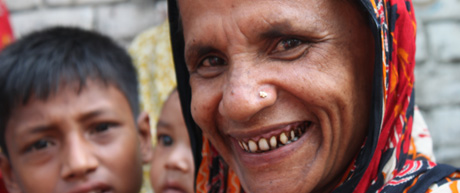Gender Responsive Budgeting

Gender Responsive Budgeting (GRB) has emerged as an effective tool for mainstreaming gender concerns into public policy. It is a method of looking at the budget formulation process, budget outlays and outputs from a gender lens. The approach is not confined to government budgets alone but includes analyses of socio-economic policies as well.
UN Women in South Asia works to strengthen budgets for women and ensure that the allocation of public resources advances gender equality. We promote knowledge on gender responsive budgeting as that helps replicate good practices. Through capacity building of stakeholders, we strengthen the skills of those who can lead these processes across the region.
In Afghanistan:
Efforts are being made to assist the government in looking at gaps in resource allocation and their adverse implications. We also identify key entry points for gender interventions within the fiscal processes. Through the programme, we provide technical skills to those ministries and institutions responsible for undertaking the corrective measures.
In Nepal:
- GRB Committee (GRBC) was set up within the Ministry of Finance in 2006. At the recommendation of the GRBC, the Government revised the existing software and incorporated the principles of GRB, making it mandatory for all government machineries to use it in all planning exercises or budget preparations.
- A Gender Budget Audit was undertaken in the Ministries of Labour and Transport Management and Forest and Soil Conservation.
- Studies have been conducted to review aid effectiveness from a gender perspective and aid effectiveness linked to GRB.
- UN Women and the Ministry of Finance have improved tracking mechanisms and reformed existing budget forms and software such as the Budget Management Information System (BMIS) to track gender budgeting. As a result, gender budgets increased from 11.30 percent in fiscal year 2007/ 08 to 17.3 percent in 2009/2011
In India:
- Knowledge products have helped build capacity on GRB. The Ministry of Women and Child Development with technical support from UNDP and UN Women produced a handbook and trainers’ manual on GRB for Ministries and Departments of the Government. The Training Manual has been prepared and adapted as per State specifications to train and mentor resource persons.
- Many ministries now analyze programmes to make them gender sensitive, and develop Gender Budgeting Statements to track expenditure and analyze how it benefits women. Some of these achievements can be attributed to the technical expertise provided by UN Women to the Government of India on gender budgeting.
- To date approximately 400 people have been trained on the importance of gender budgeting across ministries, and more specifically, in the mechanics of doing so.
- In 2010, for the first time, the Reserve Bank of India brought together 70 bankers for trainings on gender-responsive budgeting and women’s credit needs.